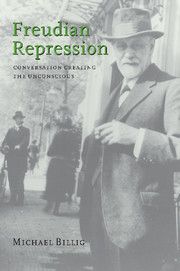Book contents
- Frontmatter
- Contents
- Acknowledgements
- 1 Introduction
- 2 The importance of repression
- 3 Thinking, speaking and repressing
- 4 Language, politeness and desire
- 5 Oedipal desires and Oedipal parents
- 6 Remembering to forget
- 7 Words of unconscious love
- 8 Repressing an oppressed identity
- 9 Ideological implications
- References
- Subject index
- Name index
4 - Language, politeness and desire
Published online by Cambridge University Press: 22 September 2009
- Frontmatter
- Contents
- Acknowledgements
- 1 Introduction
- 2 The importance of repression
- 3 Thinking, speaking and repressing
- 4 Language, politeness and desire
- 5 Oedipal desires and Oedipal parents
- 6 Remembering to forget
- 7 Words of unconscious love
- 8 Repressing an oppressed identity
- 9 Ideological implications
- References
- Subject index
- Name index
Summary
When Paul, the so-called ‘Rat Man’, was uttering his defensive formulae to himself, hoping to ward off his inner voices, he was demonstrating the links between language and repression. There are two ways of looking at such links. In the first place, the links might be considered to be rather loose. Language, it might be thought, provides a means for accomplishing repression. But what is to be repressed exists outside language. This would certainly fit in well with Freud's vision of the battle between the id and the ego, between biology and civilization. Accordingly, the ‘civilized’ person uses language in the constant battle to keep at bay the biological desires, which stand outside, and which threaten to topple, the moral order. Paul's urge to kill his girlfriend's grandmother and his fantasies of performing shameful acts with women would have been expressions of instinctual longings. The instincts of sex and aggression – indeed, the roots of desire itself – would, on this account, lie outside language.
There is another way of looking at the links between language and repression. This is not to locate the objects of repression necessarily outside the realm of language. Paul, in attempting to dismiss his thoughts, would not, as it were, be attempting to push away alien objects. Instead, the objects of repression – his complex and often precise desires – would themselves be formed in language. More than this, the psychic battleground may not be dominated by the conflict between language and wordless instinct.
- Type
- Chapter
- Information
- Freudian RepressionConversation Creating the Unconscious, pp. 71 - 103Publisher: Cambridge University PressPrint publication year: 1999



